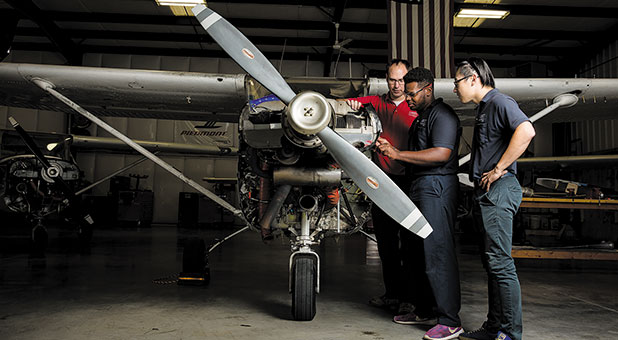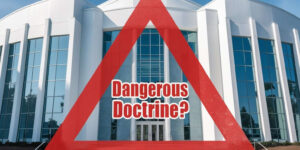How Liberty University Charts the Course for the Future Work Force
Liberty University celebrated the 47th year of fulfilling its mission, “Training Champions for Christ,” in 2018. Few institutions of Liberty’s size have reached this mark with such a large and diverse set of academic programs.
The increase in degrees and specializations since Liberty’s early years as a Bible college is staggering. In the last 10 years alone, the number of residential programs has increased by more than 115 percent. Online programs have risen more than threefold, with over 300 currently available.
Liberty stands out as one of the fastest-growing universities in higher education, and its reputation for academic excellence continues to raise its national profile. But this hasn’t occurred without a carefully orchestrated plan and dedicated navigators who constantly study the sea of opportunities for students.
As the tide of debate rolls in on whether a college degree today is applicable to the workplace, Liberty is the proven model in developing relevant academic programs that match market demand and lead to student success after graduation.
Setting Sail
A common question posed by prospective students and their parents is how their chosen major could translate into a job.
At Liberty, the path an academic program must take from proposal to degree is stringent. Ideas for new programs are generated from across the university. Then a team from the University Research and Analysis Office explores the higher education marketplace and student demand for the program, as well as labor data, and develops a competitive profile for the proposed program.
The process includes a deep dive into current job postings to identify the most sought-after knowledge, skills, technological competencies and credentials that employers are seeking.
One example is the university’s cybersecurity programs. Data from the Bureau of Labor Statistics shows that employment trends are rising steeply in this field; about 300,000 cybersecurity-related jobs were posted last year nationwide. The university’s research and analysis team looked at the cybersecurity degrees being conferred by all colleges in 2016—about 66,000 (a 44 percent increase from 2012)—then helped the School of Business strengthen its six cybersecurity programs. The team broke down the premium skills and certifications listed in job postings in the last 12 months (ranging from specific software skills to security clearance) and set to work building curriculum that would round out the resumes of future graduates. In August 2018, Liberty University’s Center for Cyber Excellence was formally recognized by the National Security Agency and the Department of Homeland Security as a National Center of Academic Excellence in Cyber Defense Education.
Additionally, Liberty has developed or improved several other programs where alumni are already making an impact in high-demand fields, including health care, digital media and aeronautics.
Coming on Board
The attention to workforce development is part of what Liberty leaders are calling a “culture shift” in higher education.
“When it’s done well, it’s not just about adding more programs in record time; it’s about choosing the right people to teach the material,” said Dr. Gabe Etzel, Rawlings School of Divinity administrative dean. “It’s about seeing the value of a professor who also remains active in their field or bringing in guest speakers who are leading experts or building partnerships with like-minded organizations. It’s a change of culture in academics, and Liberty has established this successfully.”
The School of Aeronautics has developed a partnership with a leading drone company, Textron Systems. Students can earn the same operator certification that the company requires of its employees and can apply for a job before they graduate.
School of Business students benefit from a partnership with Hendrick Automotive Group, the nation’s largest privately held automotive retail organization. With the company’s help, Liberty now offers the Automotive Dealership Management program, which includes practicums at dealerships.
Most universities view students as their consumers. But Liberty goes beyond that and defines the consumer as any organization where a Liberty graduate will land for a career.
Liberty looks at how graduates can meet company needs, not only where they are today but also where they will be 10 years from now. Employers help define the skills they need, and Liberty aligns the need with curriculum, making a more accomplished student for the marketplace.
Adventure Awaits
Seeing the smiles under those graduation caps is rewarding. But it doesn’t stop there. Graduation is just one part of the cycle.
“We aim to deliver the most value we can for each student where they are, anywhere in the world, and it’s a lifetime commitment we have with them—a legacy experience,” Interim Provost Scott Hicks said.
The cycle starts when Liberty develops academic programs. Students gain proper training and experience that lead to career readiness upon graduation. As alumni, they succeed on the job, and employers benefit, contributing to the university’s high rankings and reputation. This then influences prospective students, who meet with Liberty’s recruitment and enrollment team and are guided to the academic programs.
Liberty’s Career Center plays an essential role in the cycle. With relevant data in hand, the center’s staff can tailor career fairs, resources, internships and other practical career exploration opportunities to students in particular degree programs. They also help the university strengthen partnerships with employers already engaged in the process.
The Career Center has just launched its first New York City Fellowship, where students intern with some of the largest companies in the world. The center has already had success with its Washington Fellowship, a semester-long program that places students from different disciplines into internships in the nation’s capital.
Recent biomedical sciences graduate Rachael Glavin interned at the National Institutes of Health last fall, where she contributed to research in skin cancer treatment.
“It was so amazing and such fulfilling work,” Glavin said. “Now, I can look back and say, ‘These are all the things that I have done—I did this. I accomplished this.’ And it’s so cool knowing that what I did could really help someone.”
Amazing. Fulfilling. Accomplished. Those are words that show Liberty’s mission is central to the academic experience. With every new program, Liberty remains committed to training tomorrow’s leaders, whose impact will extend beyond their professions to change the world around them.
Mitzi Bible is senior managing editor, External Communications Office and Liberty Journal magazine at Liberty University. Read the complete article online at liberty.edu/journal/article/charting-the-course/.
CHARISMA is the only magazine dedicated to reporting on what the Holy Spirit is doing in the lives of believers around the world. If you are thirsty for more of God’s presence and His Holy Spirit, subscribe to CHARISMA and join a family of believers that choose to live life in the Spirit. CLICK HERE for a special offer.






































